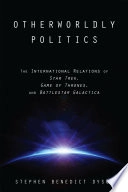To help students think critically about international relations and politics, Stephen Benedict Dyson examines the fictional but deeply political realities of three television shows: Star Trek, Game of Thrones, and Battlestar Galactica. Deeply familiar with the events, themes, characters, and plot lines of these popular shows, students can easily draw parallels from fictive worlds to contemporary international relations and political scenarios. In Dyson's experience, this engagement is frequently powerful enough to push classroom conversations out into the hallways and onto online discussion boards. In Otherworldly Politics, Dyson explains how these shows are plotted to offer alternative histories and future possibilities for humanity. Fascinated by politics and history, science fiction and fantasy screenwriters and showrunners suffuse their scripts with real-world ideas of empire, war, civilization, and culture, lending episodes a compelling intricacy and contemporary resonance. Dyson argues that science fiction and fantasy television creators share a fundamental kinship with great minds in international relations. Creators like Gene Roddenberry, George R. R. Martin, and Ronald D. Moore are world-builders of no lesser creativity, Dyson argues, than theorists such as Woodrow Wilson, Kenneth Waltz, and Alexander Wendt. Each of these thinkers imagines a realm, specifies the rules of its operation, and by so doing seeks to teach us something about ourselves and how we interact with one another. A vital spur to creative thinking for scholars and an accessible introduction for students, this book will also appeal to fans of these three influential shows.
Åtkomstkoder och digitalt tilläggsmaterial garanteras inte med begagnade böcker





















